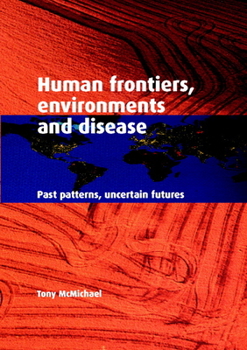Human Frontiers, Environments and Disease: Past Patterns, Uncertain Futures
Select Format
Select Condition 
Book Overview
Charting the relentless trajectory of humankind across time and geography, Tony McMichael highlights the changing survival patterns of our ancient ancestors, who roamed the African savannahs several million years ago, to today's populous, industrialized, and globalized world. McMichael explores the changes in human biology, culture, and surrounding environments that have influenced patterns of health and disease over the course of humankind's history, arguing that the health of populations is primarily a product of the interaction of human societies with the wider environment, its various ecosystems, and other life-support processes. Tony McMichael is professor of epidemiology, London School of Hygiene and Tropical Medicine. He has held positions in Australia, USA, and UK, and has taught widely in Asia, Africa, and Europe. He has advised WHO, UNEP, the World Bank and Intergovernmental Panel on Climate Change on public health issues. His previous book, Planetary Overload (Cambridge University Press, 1993) was a widely acclaimed and influential account of global environmental change and the health of the human species.
Format:Paperback
Language:English
ISBN:0521004942
ISBN13:9780521004947
Release Date:July 2001
Publisher:Cambridge University Press
Length:432 Pages
Weight:2.10 lbs.
Dimensions:1.1" x 6.6" x 9.5"
Customer Reviews
3 ratings
Will the mental health of humans 'born of the Pleistocene' be our downfall?
Published by Thriftbooks.com User , 18 years ago
While the author does mention the issue of mental health in relationship to our wacked-out species within the planet's growing urban population, I think he misses an opportunity to consider the obvious that the human ecologist Paul Shepard covered in his book NATURE AND MANDESS: our species developed into what it is biologically and psychologically in the Pleistocene. When that 'world' ended thousands of years ago, our species--in the blink of eye evolutionarily speaking--was not equipped in its brain to deal with the changes. The birhrate, and humane methods of raising children changed over night as well. Shepard seems to argue that we literally went 'nuts' as a result (agriculture, wars, walled chaotic cities, shorter life spans of dubious quality during the rise of ag, psychotic leaders, strange other-worldly monotheistic religious-belief systems, George Bush..need I go on?) I bring up Shepard because this author is aware of his work. McMichael says on page 21: "We can thus understand, says Shepard, the inner human needs for contact with wilderness, with animal species, and with symbolic place. To depart from the conditions, the rhythms, and the interdependence of the natural world is both to stunt our own human essence and to risk damaging the environment's support systems." Here is the health/environment connection that McMichael only alludes to but which may end up being THE most critical: Our species--now alomost completely devoid of ANY connection to a rapidly disappearing natural environment--, and which is now rapidly cramming itself into urban slums when it's not waging wars,(See Davis, Planet of Slums), has virtually gone crazy, will continue to get crazier, and because of such large-scale 'mental illness' if you will, has little hope of gettig the 'treatment' Shepard called for in his book. The prescriptions and predictions in McMichael's book are no more or less than what one finds in other recent evironmental books (i.e., will we use our brains and survive, or use our brains to kill ourselves?) Perhaps the question is more accurately: can a neurotic species like man ever regain its mental health in time to save a dying planet?
Thought provoking
Published by Thriftbooks.com User , 20 years ago
I have read this book twice - not because I found it difficult to read but because it contains so many layers of knowledge that you can think about once and again. What the book gave me was an understanding of the current ecological global situation and its implications for health, but also many "cognitive tools" to increase my understanding of the science behind the facts.
Ecology - human, animal, vegetable and planetary
Published by Thriftbooks.com User , 23 years ago
This is a tour de force, a brilliant, densely packed account of human evolutionary biology and ecology, setting the progress of the human race and its civilizations and cultures in the context of shifting environmental, climatic, social, cultural and ecological forces over the lifetime of our species. Tony McMichael describes and explains how we have reached the present human situation, the interplay of our species with the plants and animals that supply our food, and the microbes that often shorten our lives. In the short period since the industrial revolution we have made spectacular progress in every way imaginable, but now our own ingenuity and industries may threaten our very survivsl - we are at risk of endangering our life support systems to an extent that could harm them badly enough to raise questions about our own prospects for survival as a species. This is an important book for everyone who cares about life - our lives, and the lives of other species with which we are interdependent.






